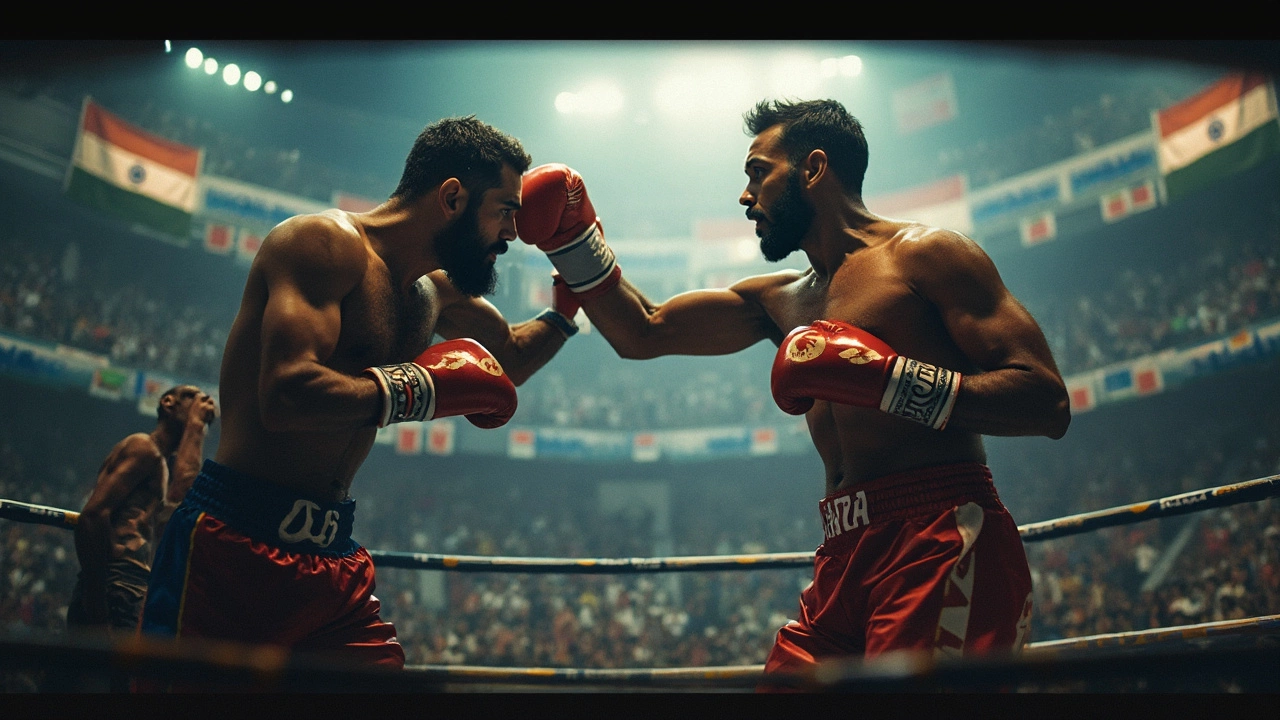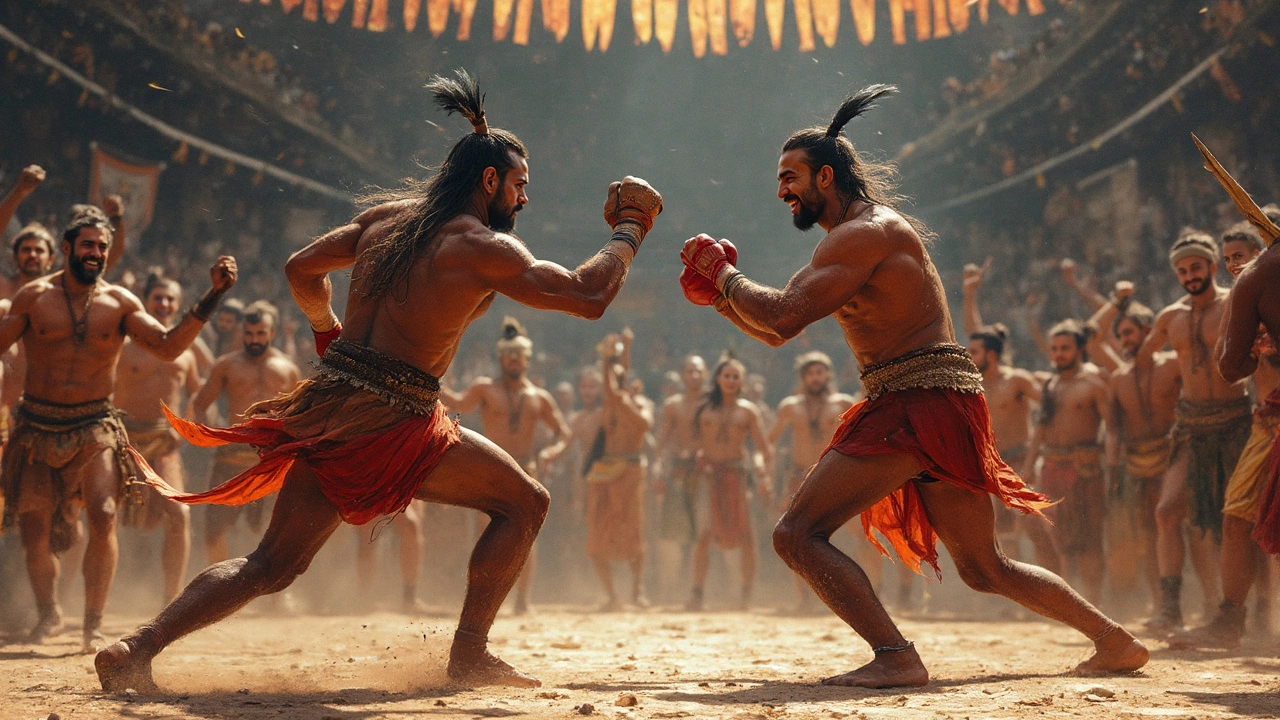Boxing is like a universe of its own, complete with a language that might sound like gibberish if you're not in the know. One of the first things you'll pick up is how fighters and fans refer to the bouts. Boxers don't just 'fight'; they might 'scrap,' 'duke it out,' or engage in a 'contest.' It's like they're in on some big secret code filled with history and tradition. And honestly, digging into this lingo can make watching or following the sport a whole lot more exciting.
Now, why do boxers have all these different words for essentially stepping into the ring and throwing punches? Well, each term usually has its own vibe or nuance. Take 'bout,' for example. It sounds almost like something you'd hear at a fencing match, dignified and kind of old-school. It's a throwback to when boxing was trying to shake off its more brutal image and present it as a gentlemanly contest. And then there's 'scrap,' a word that seems to capture the raw intensity and no-holds-barred nature, hinting that it's more street than sport. Knowing the difference isn't just fun trivia—it helps you get to the heart of boxing's culture and evolution.
- The Basics of Boxing Lingo
- Popular Terms for a Fight
- Historical Context of Fight Names
- The Role of Promoters and Media
- How Terminology Affects Perception
The Basics of Boxing Lingo
Boxing lingo might feel like stepping into a secret club with its own jargon. Whether you're a newcomer or a casual fan, understanding these terms is like getting the keys to the kingdom. So, what are these magic words, and why do they matter?
Mainly, boxers use terms like "bout," "fight," "match," or "scrap"—each word painting the sport with a different brush. The word "bout" often pops up in official settings, like in discussions involving regulatory bodies or when describing schedule cards in sports media. It's clean, neutral, and packed with history. It's what you might see on a ticket or when a reporter gives the play-by-play.
On the flip side, the word "scrap" brings a different flavor. It's casual, a bit gritty, suggesting a brawl where anything can happen. Dubbing a fight a "scrap" makes it feel more raw, like the fighters are ready to leave it all in the ring.
Understanding these keywords isn’t just about sounding smart over coffee with friends. It helps you gauge what to expect when the bell rings. Are we looking at a technical display in a "bout," or are things about to get wild in a "scrap"?
Let’s not forget the broader impact. Promoters and marketers know this language backward, and they tailor their messages accordingly. A "bout" might pull in an audience keen on strategy, while a "scrap" could attract thrill-seekers eager for action-packed rounds.
- Bout: Typically used in a professional context, signifies a formal engagement.
- Fight: A more casual term for any boxing event, often interchangeable with "bout."
- Match: Highlights the competitive and equal nature of the clash.
- Scrap: Implies a turbulent, tough encounter.
Learning these terms can make your boxing experience richer. They help decode what’s going on, both in and outside the ring.
Popular Terms for a Fight
Ever wonder why a boxing match can be called so many different things? Depending on who you talk to, a **boxing match** might be referred to as a 'bout,' 'scrap,' or even a 'dust-up.' Each term brings its own flavor, reflecting various aspects of the sport's history and culture.
Let's start with 'bout.' This word is often used in official settings and gives off a traditional vibe. When you hear it, you might picture ring announcers in tuxedos and judges in their best poker faces. It's almost like the sport is trying to convey its classy side, reminding everyone that it's still about skill and strategy, even amidst the punches.
Then there's 'scrap.' It sounds a bit more down-to-earth, doesn't it? This term emphasizes the raw, gritty nature of a **fight**. It's the word you'd use if you're talking about the action and adrenaline. Scraps aren't clean and methodical; they're heat-of-the-moment, edge-of-your-seat spectacles.
Lastly, consider 'dust-up.' This has a playful vibe, as if to say what's happening is just a bit of good old roughhousing. It's a nod to the more informal roots of boxing when a spontaneous match might break out anywhere folks gathered—a gym, a park, you name it. These days, you might hear this term used when describing a bout between two fighters known for their fiery personalities rather than just their rankings.
Here’s a quick rundown of the most popular terms and what they usually mean:
- Bout: Formal, often used in official or professional contexts.
- Scrap: Informal, gritty, and emphasizes the fight’s raw intensity.
- Dust-up: Light-hearted, suggesting a less serious conflict.
Choosing the right term isn’t arbitrary—it's a window into what aspect of the **boxing match** is being highlighted. Knowing these terms isn't just about fitting in; it's about appreciating the sport on a deeper level and understanding the stories behind the language of this timeless endeavor.

Historical Context of Fight Names
Ever wondered why boxing matches are sprinkled with terms like 'bout,' 'scrap,' or 'match'? There's some fascinating history packed into these words. Back in the day, especially during the late 19th and early 20th centuries, boxing was working hard to shake off its rough-and-ready image. It wanted to position itself as a legitimate and organized sport. This led to adopting terms like 'bout,' which might sound like something out of a regal sport.
The word 'bout' comes from the world of competition and was used in contexts like wrestling and fencing. Adopting this term was all about trying to polish up boxing's image. It suggested a degree of ceremony and fairness, distancing it from its more brutal roots.
Then you've got 'scrap,' which reflects the sport's more grassroots and street-level origins. It’s a nod to a time when boxing wasn't even legal in many places and was a street brawl, often taking place in unsanctioned arenas. The term carries a raw and gritty feel, reminding us of boxing's days of underground fights.
The nickname 'match' carries a layer of acceptance too. As boxing's popularity grew, especially in the early 20th century, promoters and media used 'match' in promotional material to describe the strategic elements involved – almost like a chess match, but with fists.
The evolution of these terms shows how boxing has transformed over the years, from something gritty and underground to the highly regulated and mainstream sport it is today. It’s more than just a history lesson—these words reflect boxing's journey and its efforts to reinvent itself, striving for respectability while holding onto its exciting, edgy roots.
The Role of Promoters and Media
In the boxing world, promoters and the media play a massive role in shaping not just the matches but also the narrative surrounding each fight. These folks aren't just sitting on the sidelines; they're crafting storylines, hyping battles, and making sure the arena gets filled with fans eager for a piece of the action.
Promoters like Bob Arum with Top Rank and Eddie Hearn of Matchroom Boxing are essentially the key players in setting up matches. They negotiate contracts, set dates, and choose venues. But more than logistical masterminds, they're also the ones who package a fight. They decide whether it's just another 'match' or if it's a full-blown 'event' with undercards that add to the excitement. When you hear hype about a fight, like it being the 'bout of the century,' rest assured the promoters are behind that buzz, firing up fans and the fighters alike.
The media too has a weighted glove in this game. They've got the power to build up a fight with their narratives, analyses, and sometimes even sensationalism. What's fascinating is how the media reports and breaks down upcoming events, often zeroing in on fighter's backgrounds, training regimens, and last-minute preparations. They'll explore angles and share fighter interviews, building a storyline that can make a routine match feel like a must-see showdown.
Combine the efforts of promoters and media, and you've got a perfect storm of publicity that can turn even the lesser-known matches into hot topics. Think about the hype surrounding matches like Mayweather vs. Pacquiao or more recently, Tyson Fury's bouts. These weren't just fights; they were spectacles that gathered frenzy thanks to an excellent media strategy and relentless promotion efforts.
This dynamic can sometimes lead to criticism too. Some fans argue that certain fights are hyped beyond their actual quality, spotlighting promoters’ and media's influence in turning the sport into more of an entertainment enterprise rather than pure sport spectacle. But love it or hate it, the reality is without them, boxing wouldn't have reached such a global audience, making it the thrilling sport it is today.

How Terminology Affects Perception
When boxers use words like fight or scrap, they're not just picking random terms out of a hat. These words come loaded with meaning and can even influence how we perceive the match itself. A big-name title boxing match marketed as a 'grudge match' heightens the tension and expectation. It suggests not just a fight but an epic showdown, with personal stakes as if drawn from a movie.
Contrast that with the term 'bout,' which tends to give off a more refined vibe. In the past, promoters would use such phrases to polish the sport's image and elevate its stature. It implies rules, fair play, and mutual respect, making it sound more like a well-structured contest rather than a chaotic punch-up.
"The language of boxing isn't just jargon—it influences how audiences feel about a match," says renowned boxing commentator Teddy Atlas. "The words we use around a fight set the stage for how it's going to be remembered."
There's even research backing this up. In a study analyzing sports commentary, the choice of words directly affected audience reaction, engagement, and the perceived intensity of the match. What promoters call the fights can ramp up viewer excitement or tone it down.
In today's digital age, where live tweets and instant reactions play a massive role, the impact of this terminology is even more amplified. Whether it's the press releases, social media buzz, or shouted words in the ring, what fights are called digs deep into the psyche of viewers. That's the kind of thing that makes boxing not just a sport but a full-on event. It's why you'll hear a fighter say, "Let's settle it in the ring," and immediately know there's more to it than just trading punches.
